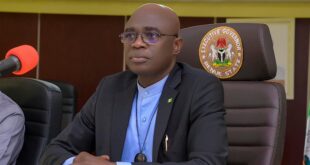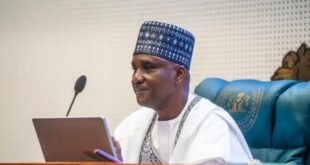
An award-winning broadcaster and internationally recognized Investigative Journalist, Ejiro Umukoro has called on the Delta State government to as a matter of urgency renovate and build juvenile centres and Government-PPP runs Safe Shelters for victims of sexual abuse.
She said the call became necessary following the rising cases of child abuse, domestic violence and sexualisation of children reported on a daily and weekly basis in Delta State and Nigeria.
She also called for a Public Vote on this issue when she spoke extensively at the recent National Seadogs Association Vito Corsica Virtual Event as Guest Speaker, unveiling the shocking statistics of abuse in Delta State and Nigeria from her investigative series titled: “Broken Boys and Girls – Trapped In COVID-19 Lockdown,” published by the Premium Times, The Guardian and amplified by the Pulitzer Centre in The USA.
Umukoro spoke on the topic: “Child Rights – The House-Help as a Metaphor of Abuse to Highlight Critical Gaps in the Orphanages, Private Shelters, and Remand Homes currently run in Delta State and Nigeria.”
Using pictorial evidence and stories of the horrors ‘houseboys’ and ‘housegirls’ in Nigeria go through, she highlights that the ‘househelp’ is the most dehumanized person in Nigeria with no protection and defence.
She disclosed that the discovery of the absence of the shelters in 16 states of Nigeria by the National Agency for the Prohibition of Trafficking in Persons, NAPTIP was a disheartening revelation to many and called for urgent action on the parts of the state government to address this anomaly.
She remarked that the Director-General of NAPTIP, Julie Okah-Donli Esq, in an interview stated that the national body in charge of protecting and providing social shelters for victims only has 338 shelters in only 10 states across Nigeria. The remaining 16 states where reports of abuse and human trafficking exist in Nigeria lack such shelters. At present, NAPTIP shelters are overwhelmed. And private-owned shelters since the lockdown have been worst hit with lack of funds, support and ease of modalities to handle the overwhelming number of abused victims.
Present at the virtual session, were the Delta State’s DG on Orientation, Eugene Azuka Uzum Esq, Executive Assistant to Delta State Governor on Special Duties/Focal Person NSIIP, Bridget Anyafulu Esq, Director Civil Service Unit, Delta State Ministry of Justice, Moses Onoriode Agewere Esq, and Journalist/Convener OKENITE Foundation for Special Needs Children, Hajia Rafatu Salami.
The discussants agreed on the need for more stringent laws and monitoring of orphanages in Delta State and Nigeria as evidence of abandonments, maltreatments, abuses had been documented against orphanages and homes.
According to Ejiro Umukoro’s investigative report, in 2020, Nigeria’s estimated population increased to 206,139,587. Of this number 46% of these population, are children – that is the equivalent of 94 million Nigerian children. Of this number, over nine million children under the age of eighteen are exposed to sexual violence every year from adults every year. More than 23 million girls are victims of early marriage. Nigeria has the largest number of child brides in Africa – Dr. Kemi Da-Silver Ibru, Nigeria records 10,000 daily reports on violence against girls and women (VAGW) incidences such as rape, sexual assault, and human trafficking among girls and women across Nigeria.
The Violence Against Children Survey (2014), the first of its kind in West Africa conducted by the National Population Commission and UNICEF revealed that 1 out of every 3 Nigerian girls experiences sexual abuse before she turns eighteen; while 1 in 10 boys in Nigeria experiences sexual violence before they turn eighteen. It is estimated that the figures may be closer to 1 in 6 boys. Two-thirds of these children who face violence and abuse never speak out, and only 4 out of 100 received any form of support.
Sadly, more than 70% of these children experience sexual violence not once, but repeatedly, often over a period of days, weeks, months, and sometimes years and often multiple types of violent abuse. The study also revealed that the cumulative loss of earnings as a result of productivity losses across different types of violence against children in Nigeria was 967 billion Naira (US $6.1 billion) accounting for 1.07 percent of Nigeria’s GDP.
Despite The Children and Young Persons Act, the juvenile justice system in Nigeria exposes children to horrendous abuse, extreme violence, and maltreatment while in police custody and remand homes according to a report by Prof. Isabella Okagbue highlighted in Ejiro Umukoro’s investigative report.
Although Delta State has domesticated the Child Right’s Law, Patricia Gbemudu, Chairman, National Association of Women Journalists, NAWOJ, Delta State Chapter says “ the Child Rights Committee needs to respond more quickly to cases, follow-up on cases reported and have more visibility across the state, as the committee is relatively not popular among many Deltans and residents of Delta”.
Recommendations and Solutions according to the Child Rights Act are against the law for anyone to refer to any child or adult as ‘househelp’. Properly addressing helpers by their names remove the stigma and pejorative now attached to the term.
Eugene Azuka, DG Orientation Bureau called for more support from CSOs.
Bridget Anyafulu, EA to Governor Okowa emphasised that it is the responsibility of the government to provide social amenities. She offered Ejiro Umukoro the opportunity to head the Delta Central axis of the Child Rights Committee in the state in the area of media support and partnership to bridge the gaps’ highlighted.
Hajia Rafatu Salami called for a framework to address the needs of househelps in terms of labour laws, terms of contracts, rest hours, entitlement to holidays, etc., while ensuring that at no time should minors is engaged in such business of househelps.
Moses Onoriode Agewere Esq emphasised the need to have a Committee on Househelp set up, emphasising that orphanages must be accessed by the government to get data across the 25 LGAs in Delta State to help CSOs, the media and other organizations have open access to these data too.
Ejiro Umukoro is calling for a need to have the Foster Care System Bill Sponsored at the State House of Assembly to bridge the gap of roaming children, street trading by minors and teens, emphasizing the need for more monitoring scrutiny of all orphanages. She also called for a Bill for the implementation and enforcement of Government-PPP Shelters Initiative across all 25 LGAs in Delta State and for the speedy domestication and passage of the Violence Against Persons Prohibition Act still sitting at the House of Assembly to be given priority. She also suggested that the Governor Ifeanyi Okowa-led government should propose an emergency executive bill to address these gaps immediately to save more children living in Delta.
According to Ejiro Umukoro, “the Child Rights Law states unequivocally that no child should be held in slavery, servitude, or abused,” highlighting that “many parents, guardians and adults hide under the guise of capital punishment and ‘do not spare the rod’ principle to mete out untold savagery on minors and teens while in fact, they are committing serious child abuse and domestic violence on such persons.” She called for more enforcement of stringent punishment on parents and other adults who commit domestic violence on minors.
Subscribe to the Advocate News letter and receive news updates daily in your inbox.
 Advocate.ng Latest news update on politics, entertainment, sport and more
Advocate.ng Latest news update on politics, entertainment, sport and more



